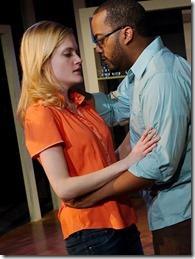
Do-Gooder
Written by Laura Jacqmin
Directed by Ann Filmer
at 16th Street Theater, Berwyn (map)
thru Feb 22 | tickets: $18 | more info
Check for half-price tickets
Read review
An engaging journey down a road paved with good intentions
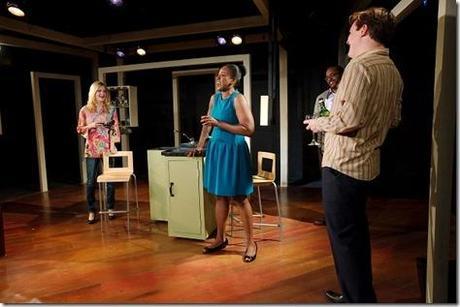
16th Street Theater presents
Do-Gooder
Review by Catey Sullivan
Laura Jacqmin‘s Do-Gooder is a small gem of a play: Tightly scripted, truly thought-provoking and oh, so very, very funny. Directed by Ann Filmer, the world premiere’s four-person story takes a massive philosophical query – What does it mean to be good? – and boils it down to an immensely engaging four-person dramedy.
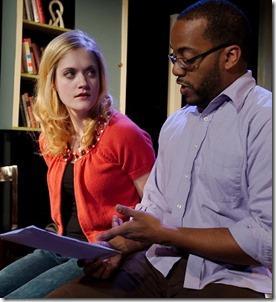
With edge-of-your-seat plotting and often hilariously authentic dialogue, Do-Gooder explores whether the landlord’s plan is admirable or a product of racism and privileged condescension. Gordon and Carmel want to help, sure, but as Jacqmin makes increasingly clear, that help will only be offered after those in need of it prove themselves worthy in the eyes of their benefactors.
Among many provocative questions Jacqmin unflinchingly raises: Is Gordon and Carmel’s beneficence rooted in a genuine concern for people who are struggling or is it more about the couple’s own desire to make themselves feel good? Are they A) genuinely giving people or B) clueless overlords co-opting a carefully selected segment of the less fortunate to tout their own altruism? And what if the answer is B? Do motives even matter when people engage in acts of charity?
All of the above might make Do-Gooder sound like a soberly earnest morality play or an academic debate gussied up to pass as a drama. That’s not the case. Jacqmin’s dialogue is rich with humor; the conversations among the quartet on stage will have you laughing out loud even as you cringe and/or roll your eyes at the behavior of Nora, Carmel, Gordon and Erik. Jacqmin has a gift for barbed, realistic, character-defining and plot-enhancing dialogue, and that gift is on display throughout.
Of the four, only Nora knows what it’s like to barely scrape by as a member of the working poor. Of course, as a skinny white woman, she’s well steeped in her own inherent privilege. But as a former diner waitress in Nowheresville, Indiana, her life was a dead end until Erik swept in, married her, and installed her like a prized doll in a lifestyle she never would have been able to afford on her own.
Just like the near-mythical family Gordon and Carmel hope to help, Nora is the beneficiary of the sort of protection that keeps her in a gilded cage, wholly dependent on her benefactor. She’s in a gilded cage but a cage nonetheless. As Erik nixes her dreams of enrolling in the local community college or getting another job, Nora’s situation begins to echo the provocative narratives of Charlotte Perkins Gilman‘s short story “The Yellow Wallpaper”, Betty Friedan‘s seminal book “The Feminine Mystique” and Henrik Ibsen‘s A Doll’s House. With Erik, Jacqmin creates a sharply contemporary portrait of controlling toxicity disguised as loving generosity.
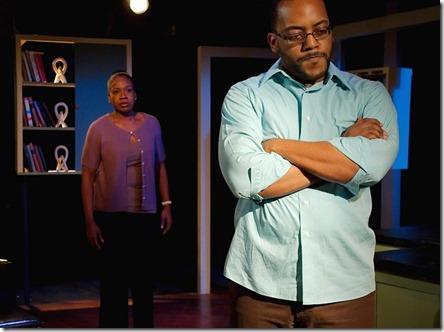
You may think you know where Do-Gooder is going as the final scene rolls around, but Jacqmin lobs a terrific curve ball at the last minute, giving the audience a didn’t-see-that-coming scene of who’s-zoomin’-who. We certainly aren’t about to give anything away, so suffice to say there’s a sudden, empowering role reversal – and a bit of stunning business with a suitcase – that will leave you inwardly cheering.
Filmer draws uniformly excellent performances from her cast. As Gordon, Haden is easy to sympathize with, a man who wants to make a difference for the better but whose attempts at doing so are impulsive and potentially ineffective. Frederick’s Carmel is a multi-layered portrait of condescension and idealism, a woman whose genuine desire to do good exposes a value system rooted in bias and patronization. Fagin’s progressively dislikeable Erik vividly depicts a rigidly patriarchal misogynist who can’t abide the idea of his wife being anything more than a helpless appendage. As for Reardon’s Nora, she turns out to be the real hero of Do-Gooder, a woman who ultimately finds the inner courage to forge a life on her own terms.
In all, Jacqmin has crafted a wonderfully entertaining and provocative drama with Do-Gooder – an engaging journey down a road paved with good intentions.
Rating: ★★★★
Do-Gooder continues through February 22nd at 16th Street Theatre, 6420 16th Street, Berwyn (map), with performances Thursdays and Fridays at 7:30pm, Saturdays 5pm and 8:30pm. Tickets are $18, and are available by phone (708-795-6704) or online through PrintTixUSA.com (check for half-price tickets at Goldstar.com). More information at 16thStreetTheatre.org. (Running time: 2 hours, includes an intermission)
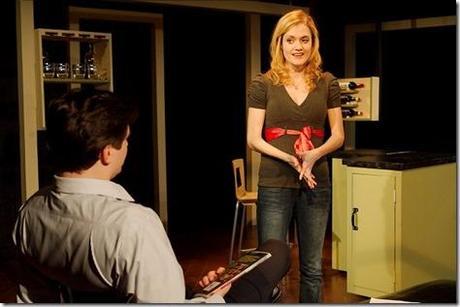
Photos by Anthony Aicardi
artists
cast
LaNisa Frederick (Carmel), Kyle Haden (Gordon), Rob Fagin (Erik), Meghan Reardon (Nora)
behind the scenes
Ann Filmer (director), John Holt (scenic design), Erik S. Barry (light design), Barry Bennett (sound design), Jesse Gaffney (props design), Rachel S. Parent (costume design), Dominique Caldwell (stage manager), Anthony Aicardi (photos)
14-0136

